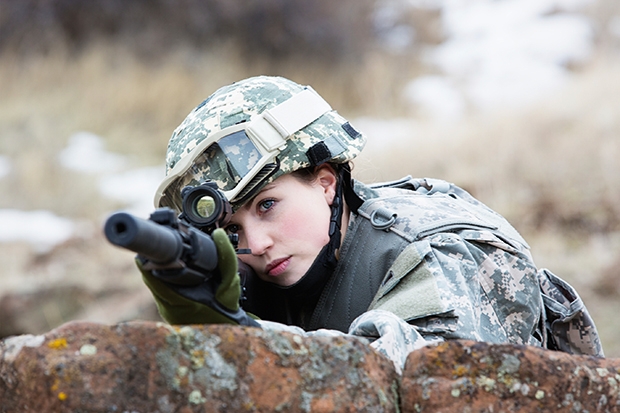My initial reaction on learning that my secondary school had compulsory CCF — Combined Cadet Force — on Wednesday afternoons was one of horror. As an ‘army brat’, the child of an officer, I was mortified to be following in my father’s footsteps and completing assault courses and weighted swims every single week. However, my view of the CCF was to change dramatically over the following five years.
At 14, I aimed to be the coolest camo-clad teenager for our first day. On the evening before, we lurked in our boarding houses and laboriously pinned in our trousers, practised ‘messy buns’ and pouted in a mirror while sporting red lipstick. Unfortunately, my father had other ideas. Next day I was pulled out in front of everyone on parade to display the high shine on my boots and the immaculate creases on every piece of uniform, painstakingly polished on and ironed in over the previous weekend by my proud father. That one moment destroyed my reputation as a cool kid.
After that, we were split into teams of about ten, and told in no uncertain terms that we would stay in these groups for the remainder of our time in the CCF. To my disgust, I was the only female in a group of overenthusiastic, pimply and smelly boys. What I look back on and laugh at now is the fact that I grew to love these boys, who patiently encouraged and supported me through the following years. Two of them are still my closest friends.
CCF turned out to be just what I needed to show me the value of loyalty and the importance of friendship and how to work in a team. In U4 (aged 15) we took a long coach ride up to an army base in Yorkshire. I spent the entire journey sulking and texting my mother in complaint. We had a week of activities out on the hills and tasks in camp. And it was here that I really grew up and explored who I was and who I wanted to be.
There were so many times in those first days that I wanted to sit down and tell everyone I’d had enough. Underneath, however, I was very aware that I would be letting the side down. The boys were amazing: they carried my pack, made jokes, jostling me along with encouragement and goodwill. To my surprise, I found strength and a resilience I did not know I possessed. At the end of the week I could honestly look back and say I had enjoyed it; I was proud of my achievements and finally felt like I belonged. Although the CCF hadn’t at first seemed to be my ‘thing’, I had proven to myself that with perseverance, anything was possible.
Six months later (after impressing both my father and peers by proving to be quite a good rifle shot) I was proud to take part in the annual school competition. In short, I started the CCF as a moody teenager who didn’t want to get involved and ended it as a young woman who was ready to face university and adult life with confidence.
Four of the ten boys from my group are now serving army officers. Asked what they learned from that time, one word stood out: discipline. All of us left school highly self-disciplined and aware of ourselves and those around us. We understood that actions had consequences and that to do something well, preparation, organisation and self-motivation were vital. Those four officers attribute their successes in the military partly to what they learned in the CCF. These are skills that I strongly believe should be given to as many young people as possible.
In George Osborne’s 2015 budget, he allotted £50 million to grow the number of CCF units, at state schools in particular. The aim is to have 500 units across the UK and devolved administrations by 2020. That’s around 150 more — and this expansion is focused on less affluent areas. The MoD says four units have already been approved.
As a primary teacher working in London, I can see the far-reaching benefits that CCF would have for my pupils and their families. Many of the children in my care, for example, come from homes that lack stability or a strong male role model. The CCF is a home and the bonds that are formed are long-lasting and strong. For children who come from broken homes, this is an opportunity for them to be part of something that is continuous and provides them with the support that they are missing.
For many, it could also give direction and education on the road they should choose in adult life. The CCF would equip them with the skills needed to enter society as well-rounded individuals who are strong, resilient, loyal, respectful and self-disciplined.






Comments